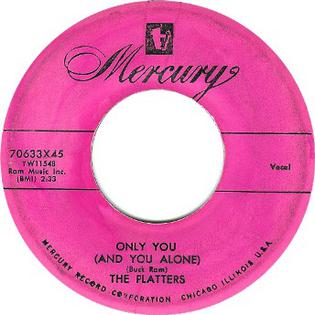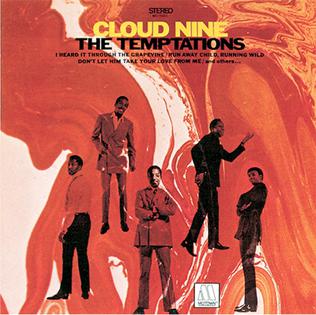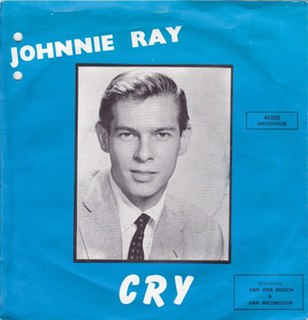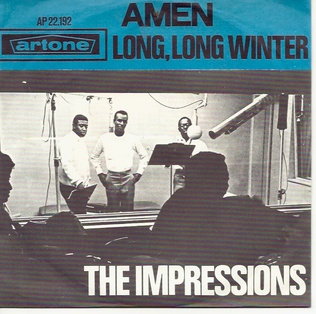Related Research Articles

Spacemen 3 were an English neo-psychedelia space rock band, formed in 1982 in Rugby, Warwickshire, by Peter Kember and Jason Pierce, known respectively under their pseudonyms Sonic Boom and J Spaceman. Their music is known for its brand of "trance-like neo-psychedelia" consisting of heavily distorted guitar, synthesizer, and minimal chord or tempo changes.

"Only You " is a pop song composed by Buck Ram. It was originally recorded by The Platters with lead vocals by Tony Williams in 1955.The song is used in many various Hong Kong comedy films.
"Live It Up, Pt. 1 & 2" is a funk/rock song released by the Isley Brothers, on their album of the same name in 1974 on their T-Neck imprint.
"Because of You" is a popular song, written by Arthur Hammerstein and Dudley Wilkinson in 1940. It was used in the 1951 film I Was an American Spy.

Cloud Nine is the ninth studio album by American musical group The Temptations for the Gordy (Motown) label released in 1969.

"Cry" is a 1951 popular song written by Churchill Kohlman. The song was first recorded by Ruth Casey on the Cadillac label. The biggest hit version was recorded in New York City by Johnnie Ray and The Four Lads on October 16, 1951. Singer Ronnie Dove also had a big hit with the song in 1966.
"After the Dance" is a slow jam recorded by singer Marvin Gaye and released as the second single off Gaye's hit album I Want You (1976). Though it received modest success, the song was one of Marvin's best ballads and served as part of the template for quiet storm and urban contemporary ballads that came afterwards.

"Tell Me What You Want Me to Do" is the title of a number-one R&B single by singer Tevin Campbell. To date, the single is Campbell's biggest hit peaking at number 6 on the Billboard Hot 100 and spending one week at number-one on the US R&B chart. The hit song is also Tevin's one and only Adult Contemporary hit, where it peaked at number 43. The song showcases Campbell's four-octave vocal range from a low note of E2 to a D#6 during the bridge of the song.

Greatest Hits is the second greatest hits album by saxophonist Kenny G. It was released by Arista Records in 1997 and peaked at number one on the Contemporary Jazz Albums chart, number 15 on the R&B/Hip-Hop Albums chart and number 19 on the Billboard 200.
Julius Edward Dixson was an American songwriter and record company executive.

"Going in Circles" is a song written by Jerry Peters and Anita Poree, and originally performed by The Friends of Distinction on their 1969 album Grazin', reaching number 15 on the U.S. Hot 100, and number three on the R&B chart. The song has since been covered numerous times by other artists, including Isaac Hayes and Luther Vandross. In addition, the song's co-composer, Jerry Peters released his own version of the tune on his 1972 solo album Blueprint for Discovery. The Friends of Distinction's original version is an R.I.A.A. Certified Million-Seller.
Samuel Benskin was an American pianist and bandleader.

"My Babe" is a Chicago blues song and a blues standard written by Willie Dixon for Little Walter. Released in 1955 on Checker Records, a subsidiary of Chess Records, the song was the only Dixon composition ever to become a number one R&B single and it was one of the biggest hits of either of their careers.
"Stop to Love" is a song by American recording R&B/soul artist Luther Vandross. Released in 1986 as the lead single from his album Give Me the Reason. It was his first number-one single on the R&B chart since "Never Too Much" in 1981. The upbeat single was also a crossover hit, peaking at number fifteen on the Billboard Hot 100.
"Space Race" is an instrumental track by Billy Preston, released as a single in 1973 on the A&M label, taken from Preston's 1973 album Everybody Likes Some Kind of Music. "Space Race" was a gold record.

"Amen" is a traditional gospel song that was popularized by The Impressions with their 1964 version.
"Last Date" is a 1960 instrumental written and performed by Floyd Cramer. It exemplifies the "slip note" style of piano playing that Cramer made popular. It peaked at number 11 on the country chart and at number two on the Hot 100 behind "Are You Lonesome Tonight?" by Elvis Presley. Cramer's recording inspired a number of successful cover versions, including a vocal adaptation by Conway Twitty.

"Mama Can't Buy You Love" is a hit single for English musician Elton John from the EP The Thom Bell Sessions. The song was written by LeRoy Bell and Casey James. Bowing at number 69 on the Hot 100 on 9 June 1979, the track became John's first US top ten hit in almost three years when it peaked at number 9 on 25 August 1979. "Mama Can't Buy You Love" also spent one week at number 1 on the Adult Contemporary chart. In the US, it was certified gold on 17 August 1979 by the RIAA.

Unforgettable – A Musical Tribute to Nat King Cole is a soundtrack album released in the UK in 1983 by the CBS Records division of Columbia in conjunction with the broadcast of American pop singer Johnny Mathis's BBC television concert special of the same name that featured Cole's daughter Natalie. The front of the original album jacket credits the concert performers as "Johnny Mathis and Natalie Cole", whereas the CD booklet reads, "Johnny Mathis with special guest Natalie Cole".
References
- ↑ Whitburn, Joel (2004). Top R&B/Hip-Hop Singles: 1942-2004. Record Research. p. 543.